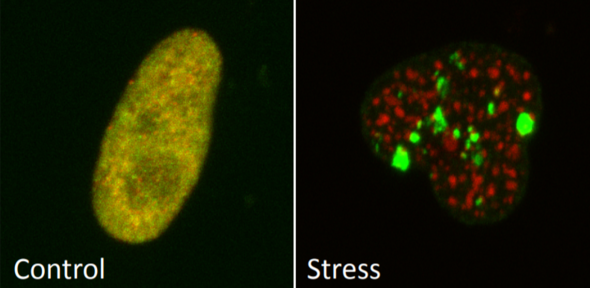
Dr Ritwick Sawarkar
Position: Group Leader
Personal home page:
PubMed journal articles - click here
Dr Ritwick Sawarkar is pleased to consider applications from prospective PhD students.
The molecular mechanisms by which chromatin exerts control over stress response is the main focus of the Unit programme. We aim to address the following questions:
- Which cellular pathways sense environmental stress/ toxins and signal to the genome?
- How does chromatin interpret the information about cellular health and toxic exposure determining the transcriptional response to stress?
- How does the transcriptional response adapt cellular phenotypes to survive the stress?
We study these three questions in the context of cellular exposure to environmental stress as well as small-molecule therapeutics in collaboration with pharmaceutical companies. Our approaches include genomics, single-cell transcriptomics, proteomics, chromatin biochemistry as well as genome-wide screening to identify novel components of stress-response pathways. Discovery-driven global approaches in mammalian cells are further validated by in vitro reconstitution experiments and mouse genetic models. We aim to gain novel insights and mechanistic understanding of transcriptional response to stress and toxins.
Symplectic Elements feed provided by Research Information, University of Cambridge
Leone S, et.al. (2024), Mol Cell. HSP70 binds to specific non-coding RNA and regulates human RNA polymerase III. PMID: 38266641
Rawat P, et.al. (2021), Mol Cell. Stress-induced nuclear condensation of NELF drives transcriptional downregulation. PMID: 33548202
Antonova A, et.al. (2019), Cell Reports. Heat-shock protein 90 controls the expression of cell-cycle genes by stabilizing metazoan-specific Host-Cell Factor HCFC1. PMID: 31693902
Aprile-Garcia F, et.al. (2019), Nat Struct Mol Biol. Nascent-protein ubiquitination is required for heat shock-induced gene downregulation in human cells. PMID: 30723328
Hummel B,et.al. (2017), Nat Struct Mol Biol. The evolutionary capacitor HSP90 buffers the regulatory effects of mammalian endogenous retroviruses. PMID: 28134929
















